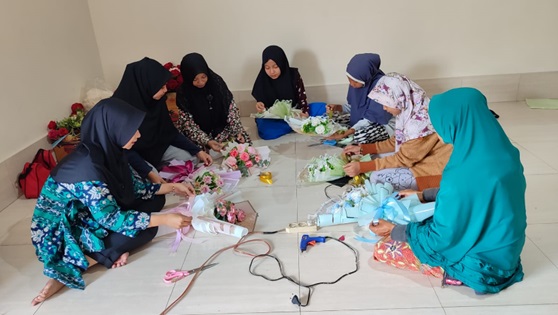Menumbuhkan Kreativitas dan Kemandirian Ekonomi melalui Wirausaha Buket Growing Creativity and Economic Independence through Bouquet Entrepreneurship
Main Article Content
Abstract
This entrepreneurial activity is carried out in the form of training in making flower bouquets and assistance in efforts to maintain and develop the business being formed. This entrepreneurial activity was motivated by the condition of the productive age population in the city of Mataram, NTB, especially in Lendang Lekong village. The productive age population consists of teenagers who are members of youth organizations. The results of the activities carried out show an increase in entrepreneurial attitudes, knowledge and skills in making bouquets and running a bouquet business to gain economic income.
Downloads
Article Details

This work is licensed under a Creative Commons Attribution-ShareAlike 4.0 International License.
Authors who publish with this journal agree to the following terms:
- Any article on the copyright is retained by the author(s).
- Author grant the journal, right of first publication with the work simultaneously licensed under a Creative Commons Attribution License that allows others to share work with acknowledgment of the work authors and initial publications in this journal.
- Authors are able to enter into a separate, additional contractual arrangements for non-exclusive distribution of published articles of work (eg, post-institutional repository) or publish it in a book, with acknowledgment of its initial publication in this journal.
- Authors are permitted and encouraged to post their work online (e.g., in institutional repositories or on their websites) prior to and during the submission process, as can lead to productive exchanges, as well as earlier and greater citation of published work.
- The article and any associated published material is distributed under the Creative Commons Attribution-ShareAlike 4.0 International License
References
Dewi, S., Listyowati, D., & Napitupulu, B. E. (2018). Bonus demografi di Indonesia: suatu anugrah atau tantangan. JISAMAR: Journal of Information System, Applied, Management, Accounting and Research, 2(3), 17–23. http://journal.stmikjayakarta.ac.id/index.php/jisamar/article/view/44
Haris, A. T. E., & Burhan, R. R. (2023). Peran perempuan dalam mendorong kemandirian ekonomi melalui kewirausahaan. SEIKO : Journal of Management & Business, 6(1), 12–21. https://doi.org/10.37531/sejaman.v5i2.3364
Hollebeek, L. D., & Macky, K. (2019). Digital Content Marketing’s Role in Fostering Consumer Engagement, Trust, and Value: Framework, Fundamental Propositions, and Implications. Journal of Interactive Marketing, 45(2019), 27–41. https://doi.org/10.1016/j.intmar.2018.07.003
Isrososiawan, S. (2013). Peran Kewirausahaan Dalam Pendidikan. Society, 4(1), 26–49. https://doi.org/10.20414/society.v4i1.329
Li, L. N., Huang, J. H., & Gao, S. Y. (2022). The Relationship Between Personality Traits and Entrepreneurial Intention Among College Students: The Mediating Role of Creativity. Frontiers in Psychology, 13, 1–10. https://doi.org/10.3389/fpsyg.2022.822206
Naudé, W. (2012). Entrepreneurship and economic development: Theory, evidence and policy. In UNU-MERIT Working Papers (Issue 31). https://papers.ssrn.com/sol3/papers.cfm?abstract_id=2314802
Sarmita, I. M. (2017). Refleksi Kritis Kondisi Demografi Indonesia: Antara Bonus Dan Bencana Demografi. Media Komunikasi Geografi, 18(1), 66–76. https://doi.org/10.23887/mkg.v18i1.10558
Satyahadewi, N., Amir, A., & Hendrianto, E. (2023). Proyeksi Peningkatan Perekonomian melalui Pemanfaatan Bonus Demografi 2040. Kaganga: Jurnal Pendidikan Sejarah Dan Riset Sosial Humaniora, 6(2), 715–725. https://doi.org/10.31539/kaganga.v6i2.7943
Wiratno, S. (2012). Pelaksanaan Pendidikan Kewirausahaan di Pendidikan Tinggi. Jurnal Pendidikan dan Kebudayaan 18(4):454. http://dx.doi.org/10.24832/jpnk.v18i4.101
